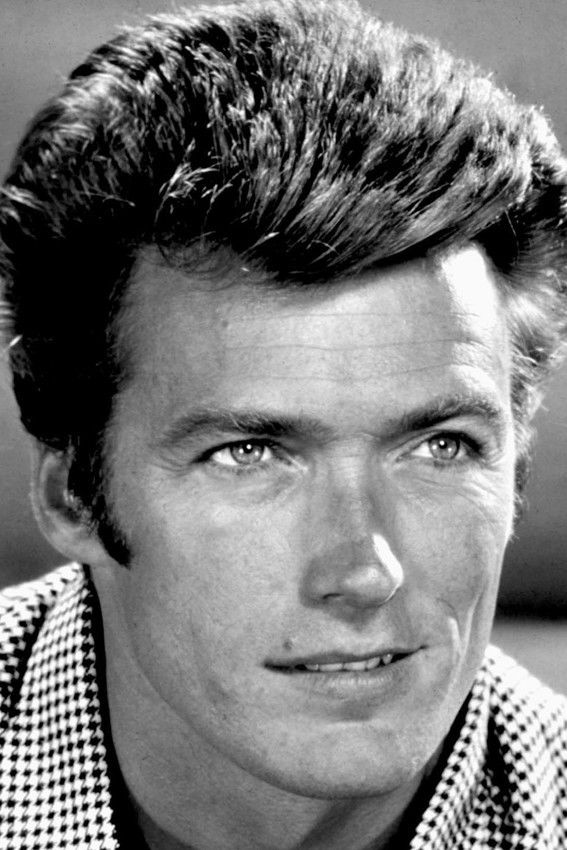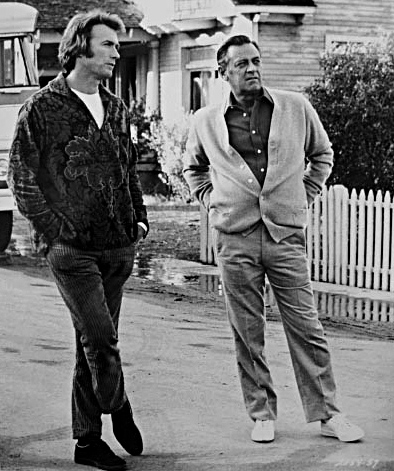Clint Eastwood
Clint Eastwood

Clint Eastwood Jr., born on May 31, 1930, is renowned as an American actor and film director. His career skyrocketed with his role as the "Man with No Name" in Sergio Leone's Dollars Trilogy during the 1960s, followed by his portrayal of antihero cop Harry Callahan in the Dirty Harry film series spanning the 1970s and 1980s. These iconic roles solidified Eastwood's status as a cultural symbol of masculinity.
In addition to his acting prowess, Eastwood achieved considerable success behind the camera. He served as the mayor of Carmel-by-the-Sea, California, for two years starting in 1986. Eastwood's directorial ventures garnered widespread acclaim, with notable works including the Western film "Unforgiven" (1992) and the sports drama "Million Dollar Baby" (2004), both of which earned him Academy Awards for Best Director and Best Picture.
Throughout his career, Eastwood's filmography has been marked by a diverse range of genres, from adventure comedies like "Every Which Way but Loose" (1978) to action films such as "In the Line of Fire" (1993) and romantic dramas like "The Bridges of Madison County" (1995). His directorial achievements extend beyond his own star vehicles, with films like "Mystic River" (2003) and "Letters from Iwo Jima" (2006) earning critical acclaim and Academy Award nominations.
Eastwood's contributions to the film industry have earned him numerous accolades, including four Academy Awards, four Golden Globe Awards, and three César Awards. He has also been honored with prestigious civilian awards from France and Italy, reflecting his global impact on cinema. Throughout his illustrious career, Eastwood's name has become synonymous with excellence in both acting and filmmaking.
Clint Eastwood was born on May 31, 1930, at Saint Francis Memorial Hospital in San Francisco, California, to Ruth and Clinton Eastwood. His mother later remarried John Belden Wood. Eastwood's birth weight of 11 pounds 6 ounces earned him the nickname "Samson" from hospital staff. He grew up with a younger sister named Jeanne Bernhardt.
Of English, Irish, Scottish, and Dutch descent, Eastwood's lineage includes Mayflower passenger William Bradford, making him the 12th generation born in North America. During his childhood, Eastwood's family moved several times due to his father's changing occupations, eventually settling in Piedmont, California, where they lived a comfortable lifestyle.
Eastwood's academic journey was marked by challenges, including being held back in middle school and facing disciplinary issues in high school, which ultimately led to his departure from Piedmont High School. Despite not graduating, Eastwood pursued various jobs, including lifeguarding, paper delivery, and grocery clerk, before being drafted into the United States Army during the Korean War.
Contrary to rumors, Eastwood did not see combat during his military service; instead, he served as a lifeguard at Fort Ord in California. His military tenure came to an eventful end when the plane he was a passenger on crashed into the ocean near Point Reyes. Eastwood and the pilot swam to safety using a life raft, and he was discharged from the army in February 1953.

Clint Eastwood's journey into acting began with a chance encounter while he was serving in the United States Army at Fort Ord. According to a CBS press release for Rawhide, Universal-International's camera crew was filming at the base when Eastwood caught the eye of an assistant, who invited him to meet the director. However, the accuracy of this account is disputed by Eastwood's biographer, Patrick McGilligan.
Another version of the story credits a man named Chuck Hill, stationed at Fort Ord, who had connections in Hollywood. Hill reintroduced Eastwood to the film industry while in Los Angeles and arranged for him to meet cameraman Irving Glassberg. Glassberg facilitated an audition under Arthur Lubin, who, although impressed by Eastwood's appearance and stature, was critical of his acting skills, describing him as "amateurish" and suggesting drama classes.
Despite initial setbacks, Eastwood persevered and secured minor roles in various films. He made his first real audition for Six Bridges to Cross in May 1954, but was rejected. Eventually, he landed a minor role in Revenge of the Creature (1955) directed by Jack Arnold. Over the next few years, Eastwood appeared in several films, including Lady Godiva of Coventry (1955), Francis in the Navy (1955), Tarantula (1955), Never Say Goodbye (1955), and Law Man (1955).
Eastwood also ventured into television, making his debut on NBC's Allen in Movieland in 1955. He continued to land small roles in both film and television, but struggled to establish himself. Universal terminated his contract in October 1955, leading Eastwood to join different talent agencies to pursue further opportunities.
In 1958, Eastwood appeared in Lafayette Escadrille and Ambush at Cimarron Pass, the latter of which he considered a low point in his career. Despite the challenges, Eastwood's determination eventually paid off, leading him to more significant roles and eventual stardom in the years to come.
In 1958, Clint Eastwood landed the role of Rowdy Yates in the CBS western series Rawhide, marking a significant breakthrough in his career. However, Eastwood was not entirely satisfied with his character portrayal, feeling that Rowdy was too young and lacking depth compared to his own age and experience.
Filming for Rawhide began in Arizona during the summer of 1958, and the show quickly gained popularity, reaching the top 20 in TV ratings within just three weeks. Although Rawhide never won an Emmy, it enjoyed several years of success, peaking at number six in the ratings between October 1960 and April 1961.
Despite its success, the Rawhide years (1959–65) were incredibly demanding for Eastwood. Filming often took place six days a week, with long hours averaging around 12 hours a day. Despite his hard work, some directors criticized Eastwood for not putting in enough effort.
As the show progressed, Rawhide began to decline in ratings and script quality. It was eventually canceled in the middle of the 1965–66 season due to these issues. During his time on Rawhide, Eastwood made attempts to break into directing by filming trailers for the show, but he was unable to convince producers to let him direct an episode.
Despite the challenges, Eastwood's time on Rawhide significantly boosted his career. He started earning $750 per episode in the show's first season, and by the time of its cancellation, he received $119,000 per episode as severance pay.
References
- "Honkytonk Man (1982)". Rotten Tomatoes. December 15, 1982. Retrieved May 1, 2011.
- a b Schickel, p. 378
- ^ Zmijewsky and Pfeiffer, p. 232
- ^ Munn, p. 194
- ^ Smith, p. 100
- ^ "Frankly, My Dear, I Don't Give A Damn" (PDF). AFI's 100 Years...100 Movie Quotes. Archived from the original (PDF) on March 13, 2011. Retrieved March 8, 2011.
- ^ Rogin, Michael Paul (1988). Ronald Reagan, the Movie and Other Episodes in Political Demonology. University of California Press. p. 7. ISBN 978-0-520-06469-0.
- ^ McGilligan, p. 352
- ^ Schickel, p. 389
- ^ McGilligan, p. 361
- ^ "Tightrope (1984)". Box Office Mojo. October 23, 1984. Retrieved July 23, 2013.
- ^ Schickel, p. 400
- ^ Munn, p. 95















































